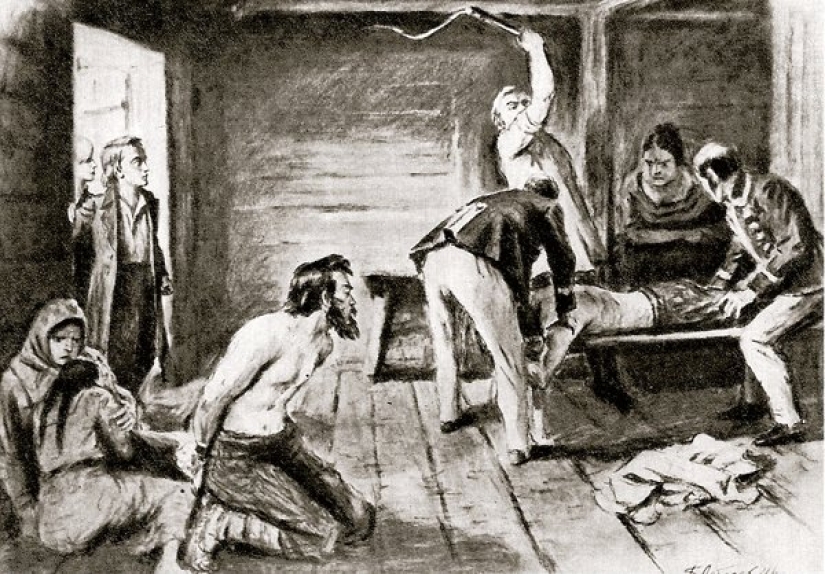How unfaithful wives were punished in Rus'
Categories: Asia | Conflict | Lifestyle | People | Relationship | Society | Tragedy | Travel | World
By Vika https://pictolic.com/article/how-unfaithful-wives-were-punished-in-rus.htmlThe difference in determining the measure of punishment was what norms the offended spouse was guided by: law or tradition What the law said In the legislation of both Ancient Rus' and later times, the subordinate role of women was an obvious and non-interpretable fact. In the oldest set of laws - Russian Pravda - which arose under Prince Yaroslav the Wise and retained its significance until the 16th century, the same vira (fine) was imposed for the murder of a man and a woman, however, there was a caveat: if a woman turned out to be “guilty” (that is, she cheated on her husband, for example), then the virus was reduced to 20 hryvnias. In the “Sudebnik” of 1497, such subtleties were not considered, and the punishment for the murder of both a woman and a man was the same. In the vast majority of cases, this was a monetary fine. Bodily injuries were punished quite mildly according to the Sudebnik. If the parties were ready to come to an agreement and make peace, then the punishment was not provided at all.
3 PHOTOS

1. That is, the husband had the right to punish his wife as he liked, and the law could punish him only if the wife died as a result.
The right and even the obligation of a husband to “teach” his wife was recorded in the document of the 16th century “Domostroye”. This book, although it insisted that a husband and wife should live in harmony, and warned against excessive beating "in the hearts" at random - with a fist, kick, or staff, still taught how to punish a wife if she does not understand words. It was possible to “teach” with a whip, but in private - “it’s both reasonable and painful, and scary and healthy,” and having whipped, forgive and take a nap.
In the event of a wife's infidelity, the husband could demand a divorce, and, as a rule, such a demand was satisfied. An unfaithful wife was put outside the threshold, her dowry remained with her husband, as with the offending side, and the woman was free to go to all four sides. At the same time, the betrayal of her husband was not a reason for divorce.
In general, family matters, like other issues of morality, were until the New Age in the jurisdiction of the Church. The Church, in any case, sought to preserve the marriage.
The guilty wife, depending on the degree of her guilt, could be imprisoned for some time in a monastery, or limited to the imposition of penance on her. Penance was also relied upon for a husband who had sinned against family foundations, but, as a rule, it was softer.

2. What did tradition require?
The presence of laws and good teachings of various kinds did not mean at all that these laws were being fulfilled, but those teachings were heeded. Just the opposite.
If a woman from privileged estates, a noblewoman or noblewoman, could count on the help and intercession of her relatives, and in the worst case she was threatened with divorce and imprisonment in a monastery, then peasant women, as a rule, had a much harder time. They were seldom interceded by their parents or brothers, because by her debauchery she dishonored them in the eyes of the rural community. There was an opinion that the husband of his wife is a complete master and he is free to punish the unfaithful spouse, as his soul desires.
The most common punishment was, of course, beatings. A husband could beat his wife with a whip or rods, as Domostroy advised, but this relatively “humane” punishment was rarely limited. Unfaithful wives were beaten with sticks, beaten with logs, and kicked, and this often ended in serious injuries.
Often the husband did not confine himself to “domestic” punishment, but publicly humiliated and dishonored his wife who had sinned. In different regions of Russia, different disgraceful punishments were applied.
In the central regions, a delinquent woman could be tied to a pole and left like that for several days. They could strip naked and drive around the village with "music" or drumming - stabbing at the bottom of a bowler hat or basin. At the same time, they threw sewage into the unfortunate woman, covered her eyes with sand and dust, and mocked her in every possible way.
Among the Cossacks, the custom of "bathing" the guilty wife in the hole was widespread. The husband could also tie his wife by the scythe to the horse's tail and flog her with a whip while sitting on horseback. Sometimes the guilty husband hung upside down in the courtyard of the house and beat him in front of the neighbors.

3. In the south of Russia, a traitor could be tied to a grave cross, a skirt tied over her head, and left in this form for the night. The custom was also widespread to tie a woman to the wing of the mill and put it on a small turn.
And in the central and southern regions of Russia, in Altai, etc. It was a common custom to harness a woman guilty of adultery to a cart. Sometimes she was harnessed next to the horse, sometimes she had to pull the cart alone. Often the woman was stripped naked. The husband got into the wagon and drove this “team” through the whole village, whipping it with a whip. This punishment, as a rule, ended with the death or severe mutilation of the woman.
At the same time, the husband was not brought to criminal responsibility for beatings. He could only be punished if the woman died. But this happened quite rarely, relatives usually “covered” the domestic tyrant, explaining the death of a woman with the usual reasons in peasant life: she fell, hurt herself, slipped on the walkways and drowned, and so on. However, the church could impose penance on the fanatic for beating his wife for 6 years.
Keywords: Russia | Russians | Family | Family rules | Punishment | Russia women | Family laws | Culture | Nations
Post News ArticleRecent articles

It's high time to admit that this whole hipster idea has gone too far. The concept has become so popular that even restaurants have ...

There is a perception that people only use 10% of their brain potential. But the heroes of our review, apparently, found a way to ...
Related articles

In Imperial times women had no power over him. The sphere of influence of the peasant and the boyar wives was limited to raising ...

Millions of people around the world buy lottery tickets in the hope of winning a happy life. They dream of luxury cars, luxury ...

Many people mistakenly believe that love is "butterflies in the stomach", passionate kisses in the rain, walks in the late evenings ...

New Year's is a time to surprise and delight loved ones not only with gifts but also with a unique presentation of the holiday ...